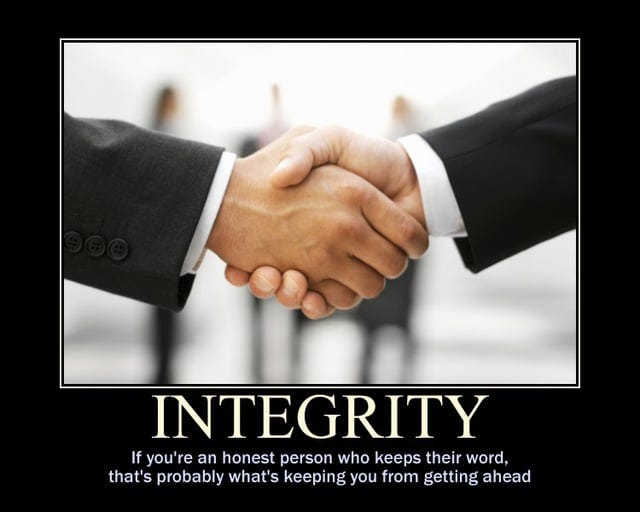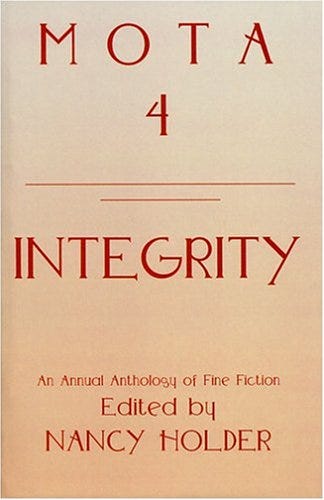Integrity Over "Loyalty"
Without integrity there's nothing.
I remember once, in an interview, someone asked me which was the most important:
Loyalty, Integrity, or Honesty?
I said integrity; without integrity, honesty and loyalty do not matter.
You can be loyal but also be dishonest and without integrity (e.g., mafia and crime families are often loyal to one another, but few consider them honest, ethical people).
You can be honest but also be disloyal and without integrity (e.g., a criminal who snitches on the other criminals he worked with to lower his prison sentence).
You can have integrity, and it is impossible to be disloyal or dishonest simultaneously.
Integrity is about honoring your word. It’s about adhering to your moral code. If you’re honest with yourself, you’ll be honest with others and behave accordingly. Integrity is about acting with consistency.
I’m not saying be a self-righteous douchebag, ugh. But I am saying that compromising morals and values is what often drives men mad and fuels addictions to cover the guilt.
You’ll notice that corrupt people are often sick and surrounded by others who are off physically and mentally: they’ve usually got some ailment, they’re morbidly obese, they’re crazy, they’re addicts, and quite frankly, the mood around them sucks. You will rarely, if ever, see them smile, and it is almost never genuine - unless it’s about the misfortune of others.
Corrupt people hate people with integrity because it is difficult to blackmail and threaten that person with their past actions.
There’s also this unspoken thing called a social contract, which is the basic framework for society and relationships. They don’t want you to know about it because you no longer have to honor it or remain loyal if they violate it.
For example, let’s say a husband cheats on his wife. When she finds out, he begs her to stay by his side because of their wedding vows and says he made a mistake. She refuses, and, upset, he tells her she is selfish and disloyal to their vows, each other, and their children. Then, he points out all her flaws and how he protected her in the past. It probably seems absurd to most people. But it’s extremely common.
Likewise, a person supposed to uphold the law—like a politician, judge, policeman, or attorney—is held to a higher standard for good reason; we trust them. That’s why when they break the law, they lose our respect, it undermines their authority, and frankly, it harms the reputation of the legal field as a whole.
Unfortunately, a person who breaks the social contract often weaponizes “loyalty” to deflect attention from their misdeeds and minimize their wrongs by putting attention onto others. Sometimes, their enablers (or co-conspirators, if you will) will also do this
This is also known as projection and emotional manipulation.
While this may seem like an odd reaction to rational and sane people, it is understandable when you consider that people who are guilty or complicit in unethical behavior always attack the messenger when their immoral behavior is questioned.
Otherwise, it would be easier to disprove false claims with facts.
And look, I get it—nobody is perfect. But so what? If nobody is perfect, then we are all imperfect, and nothing has changed. It’s just a distraction phrase.
Being imperfect doesn’t mean we relinquish our powers of observation and judgment when we see unethical behavior in others. Allowing it to happen violates our moral codes by ignoring it and making us complicit in the acts.
The saying, “The only thing necessary for the triumph of evil is for good men to do nothing,” is true but also a bit of a cliche.
I believe Elon Musk’s recent statement about our society was a bit more honest: “What I care about is the reality of goodness, not the perception of it. And what I see all over the place is people who care about looking good while doing evil. Fuck them.”
I don’t know about you, but my best friends – especially my wife – are the ones who tell me to my face when I am doing something wrong.
But they don’t need to threaten, insult, bully, or harass me to change my ways. They will call me on my bullshit and explain why.
They’re not doing it to protect themselves or their image but because they care about me. I try to do the same with them. It’s called holding each other accountable because we love and care about one another.
On the other hand, people who use bullying tactics to shut others up because they want to look good do not care about you. They only care about how they look. They must maintain that illusion at all costs, including using the “loyalty” card.
This is how dangerous cults, criminal enterprises, and government abusers operate.
Recently, I was accused of being “disloyal,” “untrustworthy,” and other insults because I wrote an article in Texas Scorecard about the Texas Rangers’ investigation into the McLennan County Sheriff. (Heads up: It’s long, but I researched it deeply.)
Notably, it includes a section about a loyalty oath to the sheriff. Although this was not central to the piece, it set the tone about loyalty’s use and abuse. (Fun fact: McLennan is the ONLY county in America with such a statement in the job applications for the sheriff’s office. Go ahead. Do an online search for the phrase “Must maintain personal loyalty to the Sheriff.” It will not appear anywhere else.)
When the article was published, a few people came out and accused me of being untrustworthy, disloyal to the Republican Party and my friends, and so on. I found that odd; I thought we were supposed to be the party of law and order, not cover-ups and secrets because it hurt my fee-fees.
One was even an elected official who had publicly made defamatory and disparaging remarks about my character.
Of course, none of them actually showed that anything presented in the article was false. I covered as much ground as possible to be fair and to avoid a lawsuit. So naturally, I was attacked as the bad guy because they couldn’t criticize my work or the facts.
This was to be expected, and I took it on anyway, knowing the likely outcome and potential price I might pay.
A similar thing happened when I wrote a story about a local activist group here in McLennan County that issued a press release expressing their disapproval of our US Congressional Senator in Texas, John Cornyn. However, one of them criticized me for the article because it didn’t represent the main party’s perspective despite providing a fair, balanced view of all sides.
This, of course, ignores the piece I wrote to help flip a seat in the county when exposing a Democrat candidate, unethical work by a Democrat organization, and exposing a Democrat front group that later led to lawsuits and stopping it in a county.
But God forbid anything comes out that counters the image!
Folks, corruption and abuse are wrong, whatever party you’re in.
You’d think that would be an obvious statement, but many adults struggle with it because it makes them potentially unpopular.
(It’s also why I am skeptical when people say they’re working on “election integrity” because they usually only care about changing the rules and outcomes until their side wins. Election integrity should be about getting as close to the real, legal results as possible, not trying to skew it to force an outcome or because you don’t like how a race went.)
Don’t try to be liked or popular with people you don’t respect. I’ve done that before, and I soon hated myself. Worse, the people you’re trying to get to like and respect you won’t anyway because they’ll rightfully see you as weak and easily malleable.
Instead, do what is right. The people you want to be with will come your way.
As for that interview I opened with, although I didn’t get that job, I got the one with Texas Scorecard shortly afterward, so it all worked out in the end.
So, after all that, I’m not going to bully you into being “loyal,” but if you enjoyed this post, I hope that you will like, share, comment (and call me out on my bullshit like my friends), or consider a subscription, as it will help more people see this Substack.
Also, my first sold and published short story was in the anthology MOTA 4: Integrity (the title was completely unintentional), available on Amazon. You don’t need to buy it, but consider using this referral link if you plan to buy something on Amazon. It costs you $0 extra, and a little piece of whatever you buy helps support this Substack.
Thank you for reading this far, even if you don’t buy anything!





Ian, do what God has called you to do, and let the Chips fall where they may. With Integrity, you will always have my support💖
Well done, Ian. As I was reading this, a number of folks I care about came to mind who would get something out of reading this, too. :) Merry Christmas!